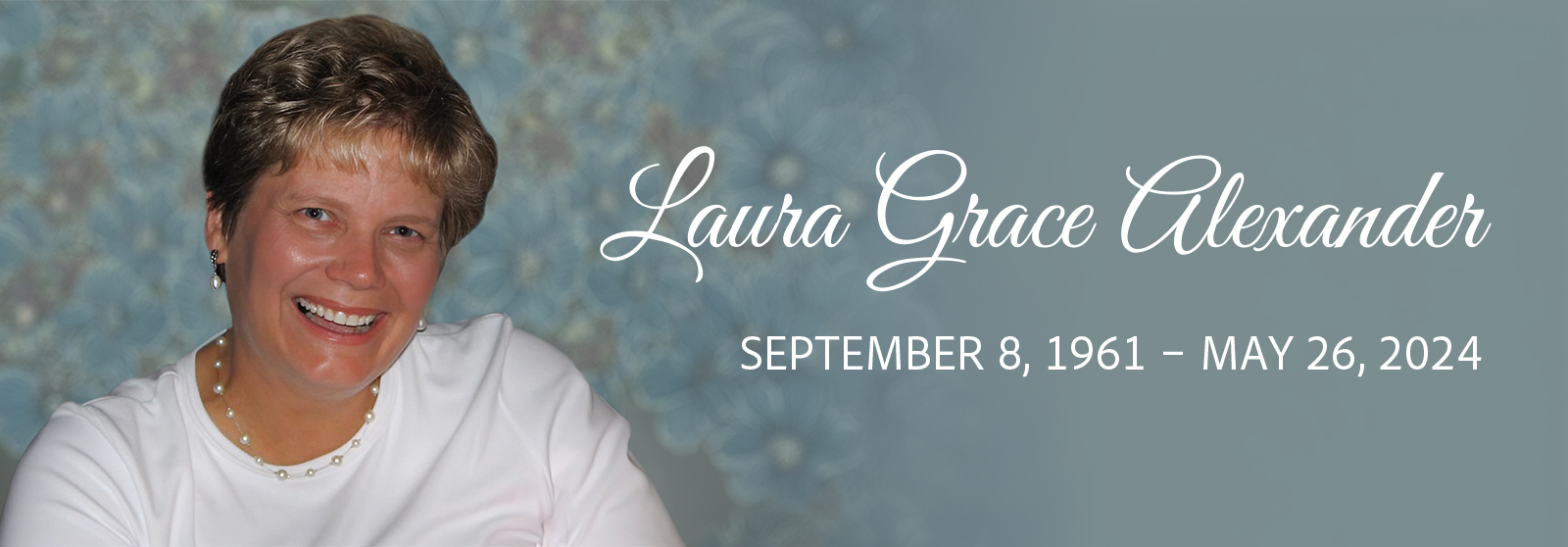In Memory of Laura Grace Alexander
For what seemed like a lifetime, many of us prayed this prayer on behalf of Laura Grace:
“Keep watch, dear Lord, with those who work, or watch, or weep this night, and give your angels charge over those who sleep. Tend the sick, Lord Christ. Give rest to the weary, bless the dying, soothe the suffering, pity the afflicted, shield the joyous; all for your love’s sake. Amen.”
—From The Book of Common Prayer
Never again will this prayer need to be uttered on her behalf. The Lord Jesus kept his watchcare over her. He tended her in sickness; he gave rest in her weariness; he soothed her suffering, and all for his love’s sake. He was faithful to her, and he preserved her faith in him.
Laura Grace battled cancer for nearly 40 years. While it was not a continuous struggle, her cancer was recurrent following long periods where it did not manifest itself. Within the last 5–7 years, however, it proved persistent in returning and resistant to treatment. It was not cancer that eventually took her life. Long before her original diagnosis she had already given her life to Jesus; her life was hidden in his. Her life was always a joyous surrender to the sovereignty of God, by whose providence she had learned the secret of contentment. Psalm 90:12 taught her “So teach us to number our days so that we may get a heart of wisdom.”
And what a heart of wisdom she attained! The knowledge aspect of her wisdom included her graduation from Frostproof High School (Frostproof, Florida), her bachelor’s in literature from the University of North Carolina at Chapel Hill, graduate studies in literature at the University of Central Florida, a Master’s degree in biblical theology from Reformed Theological Seminary in Orlando, and her doctoral work in historical theology from Oxford, England. Her love of learning was insatiable. The epitome of her learning was that she processed it all through the lens of her robust Christian faith and her innate ability to relate to all manner of people.
The other aspect of her uncommon wisdom was her manner of life itself. Simply stated, she lived a life pleasing to God (Colossians 1:10). James 1:5 encourages us, “If any of you lacks wisdom, let him ask of God, who gives generously to all without reproach.” That heavenly wisdom proved to be a continuous outpouring. Over time Laura Grace gained a quiet reputation for giving counsel. Her students sought her out; her friends depended upon her; her colleagues found her invaluable. The effect was that she gentled all our conditions.
The loveliest and most beautiful expression of her wisdom was reserved for her own life. Following her most recent diagnosis, Laura Grace hosted an elegant dinner for some of her most intimate friends. As hospitality was one of her fortes, it was not surprising that she would go to such lengths. The unexpected followed the conclusion of dinner when she gathered all around the large dining room table. In the calmest of demeanors she explained in detail her medical diagnosis and impending death. What astounded those present was her eloquent profession of faith in the sufficiency of Jesus Christ as she walked through the valley of the shadow of death (Psalm 23). Absent all drama and pretense, the sincerity of her assurance of salvation in the finished work of Christ was perhaps the most powerful homily any of those gathered had ever heard. The blessed hope of life beyond the grave, in the immediate presence of Christ, was radiant. Her guests were transfixed.
In her life Laura Grace had been a wellspring of wisdom for life. On that evening she became a fountain of wisdom for those facing death. Medieval Christians concerned themselves with ars moriendi, The Art of Dying Well. Having fulfilled her various callings in life, she was now resolved by faith to fulfill this last calling pertaining to death. Those who tended her in the next months, from the medical community to family, friends, and pastors, witnessed how her life’s wisdom culminated in how she in fact, died well.
Laura Grace was one of the original nine founding board members of The Geneva School in the summer of 1993. With her educational pedigree and teaching experience, she proved to be a voice of reason, imagination, and especially vision. She had, as C. S. Lewis wrote in Perelandra, “‘A sailor’s look,’ Ransom once said to me. ‘You know, eyes that are impregnated with distance.’” In those early years of the school, no one could predict what the school could look like 31 years later, but Laura Grace always entertained the possibility that the school and its facilities would embody the influential heritage of its Christian classical foundations. As a champion of the good, the true, and the beautiful, she resonated with G.K. Chesterton’s adage that “cathedrals are arguments in stone.” To that end she stewarded her persuasive influence and resources to help ensure that Geneva’s facilities would make that argument to the watching world.
She also used that persuasive influence within the classroom to make certain that our students could make that same argument in word and deed before the watching world. For years she taught in the upper school. To say she was revered is to say that she was honored, respected, admired, and loved. One colleague said, “She ignited curiosity through her love of the literature of the Great Books. But even more than her love for books, students appreciated her love for them. Students felt known in LG’s class. They knew she wanted good for them. She opened up timid and even hard hearts by her generous care. She listened, loved, and guided.” Students perceived that it was Greatness of Soul that distinguished her.
Great literature teachers can make great writers.This was clearly the case with Laura Grace. In one of the most memorable and often quoted Tolle Lege articles (“Pick up and Read” ala St. Augustine) written by faculty members and staff, she wrote on the topic of “Human Flourishing.” The article was a natural extension of who she was and the manner of life she lived. In her own words we read,
At its core human flourishing speaks to what makes us individually and corporately fully human and what makes our lives, in every respect, fully expressive of what God intended us to be.
Perhaps a parallel example may help. I have a Hungarian Vizsla—a bird dog. Rex is a beautiful, rust-colored dog with an infectious exuberance for life that every day causes me to smile just watching him. He is a sleek, athletic hunting machine with an amazingly keen sense of smell. Occasionally I am able to take him quail hunting, an activity that gives him inexpressible delight and the opportunity to use his impressive and innate skills. I cannot fully convey to you the joy I experience from simply watching this dog work a field. It is a thing of beauty! He zigzags back and forth, leaping across ditches and barreling through palmettos, while singularly intent on finding the birds. When he catches the slightest hint of their scent, his body freezes in some of the most amazing contortions that you can imagine as he goes “on point.” Once the birds have been flushed and shot, he dutifully retrieves those that are down and proudly presents me with the fruit of his labor.
Believe me, I love to shoot quail, but I love far more watching my dog find them. He is a magnificent work of art, exhibiting at every turn and in every fiber of his being God’s phenomenal artistry as Creator. When he hunts, Rex is most fully expressing and exercising the gifts God has given him as a bird dog. He is doing what he was made to do, and I have no doubt that God delights in his handiwork everytime he sees my little dog at work. That, for me, is a picture of flourishing—fully engaged in life and bringing to bear all of our God-given gifts and abilities. Oh that I might live my life with as much joy and beauty and purposefulness before my Creator as Rex lives his! (emphasis added.)
Ireneaus could not agree more when he said, “The glory of God is man fully alive.”
The glory of God is Laura Grace Alexander fully alive—as indeed she is. In fact she is now more fully alive than at any time during her sojourn on earth. At her passing she immediately entered into the presence of Christ as he had promised she would. We lack the imagination to be able to say how exultant she is. Perhaps again, however, Lewis’ more fertile imagination can assist us. Laura Grace herself, in attempting to describe her anticipation of heaven, referred to the last scene of Lewis’ book The Last Battle, and thus of the conclusion to The Chronicles of Narnia.
In the closing pages of the book Aslan has conquered all of his enemies, and has summoned all of the faithful characters and people from the entire series unto himself. They all race to the sound of his voice, crossing meadows and valleys and even rushing headlong up great waterfalls. In mutual encouragement they cry to one another, “Come further up and further in.” Lewis continues, “And as He (Aslan) spoke He no longer looked to them like a lion, but the things that began to happen after that were so great and beautiful that I cannot write them. And for us this is the end of all the stories, and we can most truly say that they all lived happily ever after. But for them it was only the beginning of the real story. All their life in this world and all their adventures in Narnia had only been the cover and the title page: now at last they were beginning. Chapter One of the Great Story which no one on earth has read: which goes on forever: in which every chapter is better than the one before.” (emphasis added).
To which Laura Grace smiled and said, “I’m going further up and further in.”
Rev. Robert F. Ingram
For The Geneva School Board of Governors
Laura Grace Alexander’s 31 Year Involvement with The Geneva School
Founding Board member 1993–2009
Head of School 1997–1998
Vice-chair of the Board 2005–2007
Faculty member 2010–2022
Director of Development 2011–2012
Board member 2023–2024


